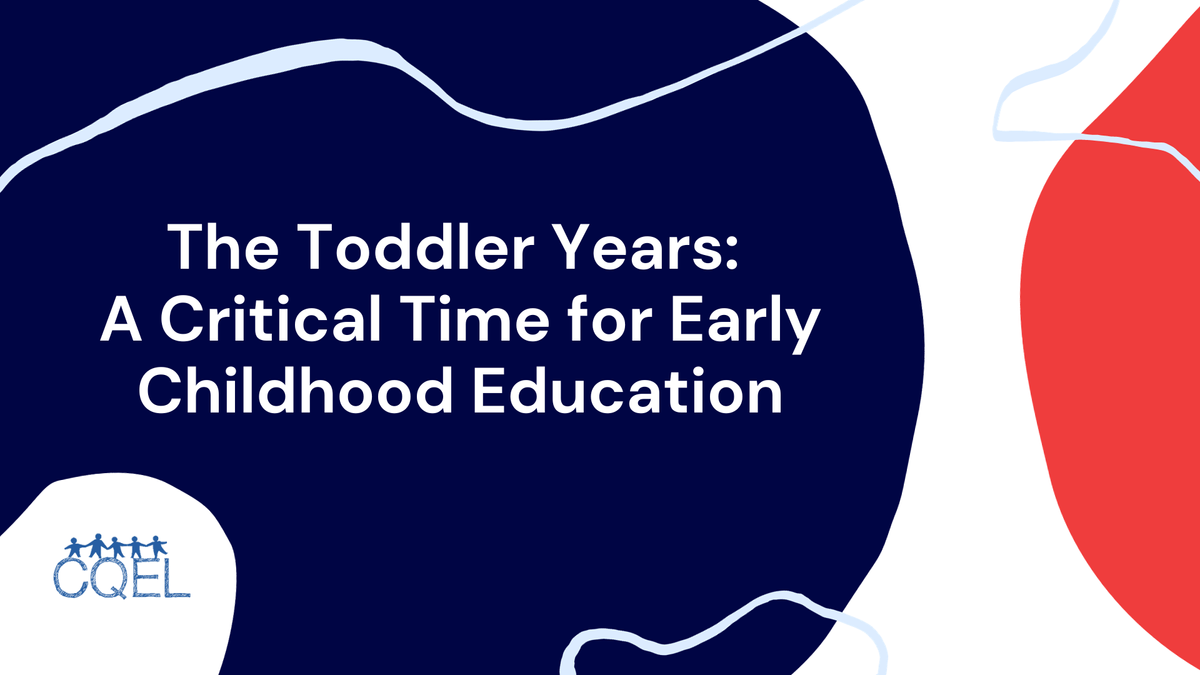The Toddler Years: A Critical Time for Early Childhood Education
The toddler years, from 18 months to 3 years old, are a critical time for early childhood education. Toddlers are rapidly developing physically, cognitively, socially, and emotionally.

The toddler years, from 18 months to 3 years old, are a critical time for early childhood education. Toddlers are rapidly developing physically, cognitively, socially, and emotionally. Early childhood educators can play a vital role in supporting toddlers' learning and development during this important time.
Research has shown that high-quality early childhood education can have a lasting impact on children's success in school and in life. Toddlers who participate in high-quality early childhood programs are more likely to be ready for kindergarten, to succeed academically, and to graduate from high school. They are also more likely to be healthy, employed, and engaged in their communities.
Early childhood educators who teach toddlers have a unique opportunity to make a difference in the lives of their students. By providing toddlers with a safe and nurturing environment, opportunities for exploration and play, and positive reinforcement, early childhood educators can help toddlers reach their full potential.
Key Developmental Milestones for Toddlers
Physical development: Toddlers are developing their gross motor skills (such as walking, running, and climbing) and fine motor skills (such as using their hands and fingers to manipulate objects). They are also developing their coordination and balance.
Cognitive development: Toddlers are developing their language skills, problem-solving skills, and memory. They are also beginning to learn about the world around them through exploration and play.
Social and emotional development: Toddlers are developing their self-awareness, self-control, and empathy. They are also learning how to interact with others and form relationships.
Teaching Toddlers
Creating a safe and nurturing environment: Toddlers need a safe and nurturing environment where they feel loved and accepted. Early childhood educators can create this environment by being warm and responsive to toddlers' needs, and by establishing clear and consistent expectations.
Providing opportunities for exploration and play: Toddlers learn best through play. Early childhood educators can provide toddlers with opportunities for exploration and play by providing them with a variety of materials and activities.
Using positive reinforcement: Positive reinforcement is a powerful tool for teaching toddlers. Early childhood educators can use positive reinforcement to encourage toddlers to engage in desired behaviors.
Modeling appropriate behavior: Toddlers learn by observing the adults in their lives. Early childhood educators can model appropriate behavior by demonstrating the behaviors they want to see in toddlers.
Communicating effectively with toddlers and their families: Effective communication with toddlers and their families is essential. Early childhood educators should communicate regularly with parents about their toddlers' development and progress. They should also be open to feedback from parents.
Toddler Ages for Centers
Toddler care centers typically serve children between the ages of 18 months and 3 years old. Some centers may also offer care for children as young as 12 months old. It is important to choose a toddler care center that is licensed and accredited by a reputable organization.
What Teaching Toddlers Entails
Teaching toddlers entails providing them with opportunities to learn and grow in all areas of their development, including physical, cognitive, social, and emotional. Early childhood educators who teach toddlers use a variety of teaching strategies, such as play-based learning, hands-on activities, and positive reinforcement. It is also important for early childhood educators to communicate effectively with toddlers and their families.
Here are some specific examples of what teaching toddlers might entail:
- Providing opportunities for toddlers to explore their environment and learn about the world around them through play. This could involve setting up different play areas in the classroom, such as a water table, a block area, and a dress-up area. Early childhood educators can also provide toddlers with props and materials that encourage them to explore and play, such as sand, water, and blocks.
- Helping toddlers develop their fine motor skills by providing them with activities such as finger painting, building blocks, and stringing beads. Early childhood educators can also provide toddlers with opportunities to practice their fine motor skills during everyday activities, such as eating and dressing.
- Encouraging toddlers to develop their language skills by talking to them, singing songs, and reading books. Early childhood educators can also talk to toddlers about the things they are doing and the things they see around them. They can also sing songs and read books to toddlers to help them develop their vocabulary and comprehension skills.
- Helping toddlers develop their social and emotional skills by teaching them how to share, take turns, and resolve conflicts peacefully. Early childhood educators can help toddlers develop their social and emotional skills by modeling these behaviors themselves. They can also provide toddlers with opportunities to practice these skills by playing games and activities that require them to cooperate and work together.
- Working with parents to develop a comprehensive approach to early childhood education for their toddlers. Early childhood educators can work with parents to develop a plan for supporting their toddlers' learning and development at home. They can also provide parents with resources and information about early childhood education.
The toddler years are a critical time for early childhood education. By providing toddlers with the love, support, and guidance they need, early childhood educators can help them reach their full potential. Toddlers who participate in high-quality early childhood programs are more likely to be successful in school and in life. They are also more likely to be healthy, employed, and engaged in their communities.
Early childhood educators who teach toddlers have a unique opportunity to make a difference in the lives of their students. As an aspiring childcare provider in California, you can play a vital role in supporting the learning and development of toddlers by providing them with a safe and nurturing environment, opportunities for exploration and play, and positive reinforcement.
